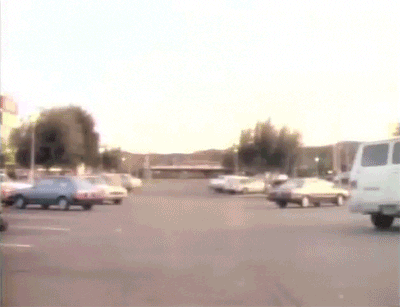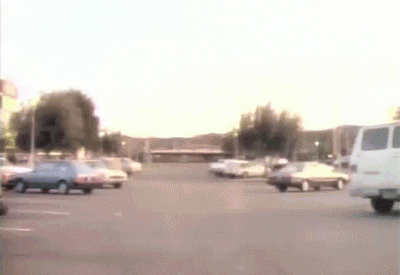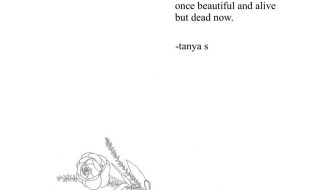*Through 1990. The band released their Greatest Hits album in 1992, and while they have released five more studio albums since that time ? a couple of them very good! ? I think the pre-Greatest Hits albums acts as a natural dividing point. I?ll use that dividing point for my purposes in ranking every ZZ Top song, from ZZ Top?s First Album through Recycler.
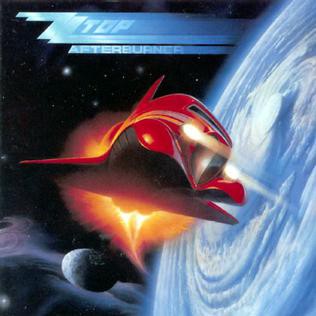
(99) Rough Boy ? Afterburner (1985): For a band with so many songs rattling in the public consciousness, it?s surprising that ZZ Top didn?t have more actual hits. Only eight ZZ Top songs made it onto the top 40 of the US Billboard Hot 100 Chart, and only five songs made it out of the 30s. Rough Boy was one of the five, topping at #22. Amazon, by whatever metrics it uses, rates Rough Boy as the most streamed song on the Afterburner album, which also produced two of the other ZZ Top songs (Sleeping Bag; Stages) that make it past #30 on the charts.
All of which makes little sense, because Rough Boy is terrible. The ballad was never ZZ Top?s strong suit, though a few of their early efforts are not without their charms (Hot, Blue and Righteous comes to mind). But Rough Boy is a dirge; it takes forever to get going, ponderous drum machine leading the way, and then arrives nowhere. Nothing interesting happens along the way, and the lyrics are silly even by ZZ Top standards (?I am the one who can fade the heat/The one they all say just can?t be beat?). Rough Boy is now forgotten and unloved; good riddance.
(98) I Got the Message ? Afterburner (1985): I Got the Message would work extraordinarily well as the background music on a Sonic the Hedgehog level, Sega Genesis era. That?s about the best I can say. This is synth-pop ZZ Top at nearly its worst.
(97) Burger Man ? Recycler (1990): Burger Man isn?t actively offensive, I?ll give it that. Just generic. Much of the 80s and 90s could be flipped around without raising too much of an objection from me. But the cheesy spoken parts in the middle drops it from, I dunno, 76 or something to third-from-last.
(96) Leila ? El Loco (1981): Rough Boy, but at a somewhat higher tempo, which results in a very minor improvement. A very minor improvement.
(95) Planet of Women ? Afterburner (1985): With so many of these Afterburner songs, the problem isn?t so much that they are individually bad, but that they all blend into each other, one fat smoothie of drum machines and too much treble and synthesizer and lyrics about God knows what ? women mostly I guess. Anyway, Planet of Women is another song like that. It made their Greatest Hits album for some reason.
(94) Tell It ? Recycler (1990): Four minutes and forty-eight seconds! That?s practically a symphony in ZZ Top terms. The material doesn?t merit the extended exposition.
(93) It?s so Hard ? El Loco (1981): I think I?m perhaps being, well, a little hard on this song from a pure musical perspective ? we?ve probably got a solid late-50s style slow jam going on here. But after a while I?ve had enough with the sex puns.
(92) Stages ? Afterburner (1985): Another song from Afterburner that charted for absolutely no good reason. I have a theory that, while 80s pop music is good, it has to be from groups formed in or very near the 80s, and that the transition was very hard (musically, if not financially) for older groups that changed their sound to meet the new style. Songs like Stages are evidence in my favor.
To be fair to the band, though: ZZ Top dabbled in many styles from the moment of their inception. The synth stuff aged the worst, but I?m not sure that having stood in place would have resulted in anything more satisfying ? plenty of bands, if not more, suffered in the 80s from failing to update their sound than from updating to something that turned out to be a dead end. And Billy Gibbons no more than anyone else could have guessed how poorly the synth stuff was going to age.
(91) Thug ? Eliminator (1983): Thug feels more like a track cut from El Loco than what the band would be from Eliminator forward. The Seinfeldesque bass interludes are unfortunately dated, and the AC/DC-like riff that follows doesn?t match the rest of the song at all. Kind of a mess.
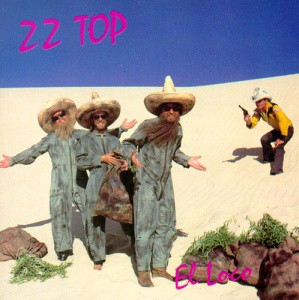
(90) Woke up with Wood ? Afterburner (1985): Get it? I guess there?s not much to get.
(89) Pearl Necklace ? El Loco (1981): One of the worst wink-nudge tracks in the ZZ Top oeuvre, not only because it?s musically uninteresting, but because no one needs a song about this.
(88) Can?t Stop Rockin? ? Afterburner (1985): The Afterburner album is 10 songs deep, like most of ZZ Top?s albums. I have Can?t Stop Rockin? fifth on my list of Afterburner songs, making it above average for the album as a whole. And yet it appears 88/99 on this list, behind any song on ZZ Top?s first six albums. And yet, let the record show, that Afterburner produced half (4 of 8) of the songs that made it to the Top 40 list for the band. What the hell?
(87) Mexican Blackbird ? Fandango! (1975): A song about picking up a Mexican prostitute, possibly an underage one, all song in a low, affected drawl. Little to recommend ? the worst ZZ Top song from any of the pre-El Loco albums.
(86) Old Man ? ZZ Top?s First Album (1971): Much of ZZ Top?s First Album sounds like a 1960s rock album. They?d never really look backwards again, at least in the same way ? Albums like Degello might reach back to the R&B songbook, but they wouldn?t be 2?3 years behind what everyone else was doing. Old Man feels dated even judged against the age in which it was recorded in a way that?s peculiar for the fifth track on a band?s first album. It?s a problem with much of the album, even the better tracks, of which Old Man isn?t.
(85) Dipping Low (In the Lap of Luxury) ? Afterburner (1985): I?ve never understood how parentheses work in a song title. Is it part of the title? Is it an unofficial addendum? If I say the title name orally, do I have to make some kind of signal, like air quotes, to show that part of the title is a parenthetical? Here it makes even less sense than usual because it?s not like the song would colloquially be called ?In the Lap of Luxury? otherwise and so you need the reminder to the casuals who might not know which track they?re looking for; the chorus is just ?Dipping Low In the Lap of Luxury? several times. Anyway here?s another crappy Afterburner track.
(84) Neighbor, Neighbor ? ZZ Top?s First Album (1971): You can understand why critics listening to ZZ Top early on heard Just Another Southern Band because, well, that?s exactly what tracks like Neighbor, Neighbor sound like.
(83) Bad Girl ? Eliminator (1983): I just can?t do the faux live thing. Gibbons? voice is awful here. Damn it, let Dusty sing!
(82) Esther Be the One ? Degello (1979): A nothing track to end a great album. The chintzy sound effects are a grim foreboding of some of the worst that was to come from the band.
(81) Doubleback ? Recycler (1990): Doubleback was in Back to the Future Part III, which sums up just about everything you need to know about both the movie and where ZZ Top was at stylistically by this point. Amusing how many of the Recycler songs ended up on the Greatest Hits album, which came out two years later. They wouldn?t be anywhere near a similar album put out today.
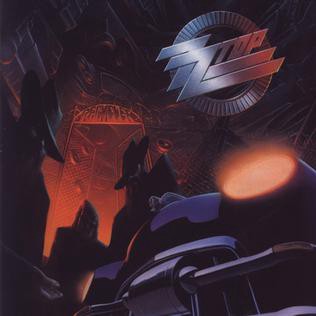
(80) Ko Ko Blue ? Rio Grande Mud (1972): At their worst, ZZ Top had a habit of confusing puns or double-entendres with cleverness, and you see some of that pop up in their early work as well. Koko Blue is a good example ? some of Ko Ko?s pie and all that ? and the music itself doesn?t stand out enough to save it.
(79) Lovething ? Recycler (1990): You can almost feel ZZ Top trying to reach back and grab something that isn?t there any longer on tracks like Lovething. A track like this would have had some magic a decade before but now feels formulaic and muddled. The band would rediscover some of the magic post-Recycler, but this list is getting long enough as it is.
(78) Ten Dollar Man ? Tejas (1976): Tejas goes in a lot of directions, most of them interesting. But Ten Dollar Man sounds and feels like something cut from a lesser Creedence Clearwater Revival album ? Fortunate Son, but worse, and Fortunate Son is already pretty bad.
(77) Brown Sugar ? ZZ Top?s First Album (1971): Feels kind of icky today for the same reason The Rolling Stones song of the same title feels kind of icky. Also one of the few ZZ Top songs that, at about five-and-a-half minutes, drags to a conclusion; for all the band?s faults, overstaying their welcome in any particular song generally wasn?t one of them. The slow intro does have its charms though. There?s a live version on YouTube worth checking out, just to see the Reverend BFG at some of his best.
(76) Heaven, Hell or Houston ? El Loco (1981): Man, what the hell is this even, with the weird altered vocals? I will say this for El Loco: It?s not a good album, but it?s adventurous in a way that all the synthesizers weren?t. Everyone was going synthesizers in the 1980s; not everyone was doing some weird blues-funk with a Vincent Price-style monologue underneath.
(75) TV Dinners ? Eliminator (1983): A cutesy, frivolous song that, unlike much of the double entendre-laden ZZ Top catalog, is actually about the thing stated in the title, not sex. There might have been a way to pull this off in a bluesy, I?m-so-broke kind of way, but TV Dinners mostly comes off as lame.
(74) Ten Foot Pole ? El Loco (1981): Billy Gibbons does a weird Boomhauer thing on vocals that doesn?t come close to working. And yes, another sex pun thing.
(73) Bar-B-Q ? Rio Grande Mud (1972): A generic blues-song-about-something-but-it?s-really-about-sex song. Would rank a little higher except that the opening was edited to interfere with the closing measure of the far superior Apologies to Pearly, which is a crime.
(72) She?s a Heartbreaker ? Tejas (1976): The most country song off Tejas, and it simply isn?t ZZ Top?s idiom. Drawling Billy Gibbons is the second-worst Billy Gibbons as far as vocals go, just ahead of screeching Billy Gibbons. Not sure where the fiddle came from.
(71) Dirty Dog ? Eliminator (1983): For such an acclaimed album ? widely believed to ZZ Top?s best, though not be me ? Eliminator sure includes a lot of filler.
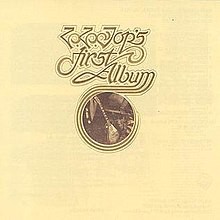
(70) Goin? Down to Mexico ? ZZ Top?s First Album (1971): The very first Dusty Hill solo vocals track but otherwise unremarkable.
(69) Penthouse Eyes ? Recycler (1990): There?s a decent song hiding in Penthouse Eyes, but the energy and rawness from the earlier albums is missing. Feels like Degello-era ZZ Top could have made something solid of Penthouse Eyes ? bluesy rhythm, solid driving base line ? but it just kind of lingers for a few minutes and then ends.
(68) Don?t Tease Me ? El Loco (1981): An increasingly rare (by this point in their catalog) duel-lyrics song out of the trio. There?s a key change that goes on in the chorus that makes it sound like something out of a a beginners? music composition class. These are the sorts of things that separate the #68s from the #54s.
(67) Francine ? Rio Grande Mud (1972): Francine was ZZ Top?s first song to hit the US Billboard Hot 100 Chart and it isn?t without its charms, especially the drum work of Frank Beard (rarely the standout on any track, but he is here). The subject matter (?My Francine just turned thirteen/She?s my angelic teenage queen?) is supremely yuck, though. That Billy Gibbons didn?t actually write the song, as claimed for many years, mitigates the yuckiness somewhat but creates its own problems.
(66) Enjoy and Get It On ? Tejas (1976): There is a harder-edged tonal quality to Enjoy and Get It On that?s endearing, and you hear the stripped-down raw bluesiness that was mostly gone from Fandango! But I have a hard time listening to his and not thinking about Mr. Plow seducing Marge. Sure, that?s a me problem, not a them problem, but it?s my rankings and I?ll order these songs as I like.
(65) Delirious ? Afterburner (1985): I?m probably being generous because I?ve bagged on so many of the other Afterburner tracks, but Delirious isn?t as bad as the others. All the synths though, man.
(64) Manic Mechanic ? Degello (1979): The least-favorite song off Degello for most people, though not me personally; Esther Be the One takes that honor. But it?s not good, exactly; the jumping-octave riff is blah, and any song where Billy Gibbons adopts a weird vocal affectation is usually a bad one. Manic Mechanic also feels out of place on Degello, which is otherwise mostly a straightforward R&B-rock album. It?s here, for the very first time, that you see what direction the band is headed, and for many ZZ Top fans (including myself), that?s will induce a twinge of sadness. The guitar solo and key changes are enough to keep things interesting though. It?s also some of Frank Beard?s better work on the drums.
(63) Groovy Little Hippie Pad ? El Loco (1981): The lava-lamp thing that goes on at the start sets the stage for the rest of the track. Take that as you will.
(62) Squank ? ZZ Top?s First Album (1971): A fairly anonymous song within a blues framework. A lot of these songs on ZZ Top?s First Album start to run together, even on repeated listening. Kind of weird to hear an ode to environmentalism from the Texas trio. [Ed. ? this should probably be about thirty spots higher, you goofed this one]
(61) Backdoor Medley ? Fandango! (1975): Cards on the table: I?m not a huge fan of live performances on recording. Actual live performances, yeah, lots of fun. But with only a handful of exceptions, most bands lose too much in the translation to make listening to a live recording worthwhile. Just play the damn album.
Backdoor Medley is the last of three live tracks from the Fandango! album; it?s a meandering performance through a handful of ZZ Top?s early hits, all with some stage patter thrown in. It?s a highlight of the album for many ZZ Top fans, but not for me; I?d rather just listen to the songs. I?m sure being at the show was a blast though.
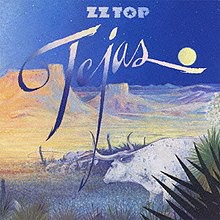
(60) Legs ? Eliminator (1983): Yeah, yeah, I know, the shag guitars, the music video, whatever. Of all the songs to blow up from Eliminator, the least justification exists for Legs? popularity ? all the synthesized excess with none of the catchiness of, say, Sharp Dressed Man, or the driving beat of Gimme All Your Lovin?. Legs also loses points for unironic use of the word ?fanny.? At least we finally know the real meaning behind the song.
(59) Concrete and Steel ? Recycler (1990): I can?t put my finger on it, but there?s just enough here to make a decent song out of Concrete and Steel. All the usual post-Eliminator problems are here, but we?re back to (mostly) stripped-down blues rock, and it works here well enough.
(58) I Got the Six ? Eliminator (1983): More of a ?riff-y? song ? dare I say metalesque? ? than you usually here out the band, and it works OK. But this falls many, many spots for ?I got the six/give me your nine.? I?m not sure that even counts as a double entendre.
(57) Sure Got Cold After the Rain Fell ? Rio Grande Mud (1972): The first ballad in the ZZ Top catalog, and not a bad effort overall, revealing a vulnerability that was absent from the band?s other work. But the lyrics are just awkward enough ? not only in theme, an extended meteorological metaphor, but in rhythm ? that it strips away some of the emotion that might otherwise be there. The seven-plus minute play time doesn?t help either. There?s a decent song in there?which was proven out when the band basically reworked Sure Got Cold After the Rain Fell into Hot, Blue and Righteous on their next album to greater effect.
(56) Bedroom Thang ? ZZ Top?s First Album (1971): I?m kind of a sucker for the low-rolling guitar riff going on here, but Bedroom Thang doesn?t really do much with it. You can sense that we still have a band trying to figure out exactly what they?re doing ? naturally, of course, for a debut effort. Things would get better, and quickly.
(55) Decision or Collision ? Recycler (1990): Decision or Collision is so close to being Actually Good. Two problems. First is that Billy Gibbons should have stepped aside on this one; tonally, it?s screaming out for Dusty Hill?s more powerful vocals. Second, the lyrics are so damned metrically awkward. The title itself gives a hint of that.
(54) I Need You Tonight ? Eliminator (1983): I Need You Tonight doesn?t have near enough material to support the over six minutes of playtime. Done better by AC/DC in Let Me Put My Love into You, which has an almost identical vibe but is much tighter. The instrumental sections work well enough though.
(53) Pan Am Highway Blues ? Tejas (1976): The hardest songs to write about are the ones right in the middle. The bad songs, well, there?s lots of ways to say something is bad. The good songs give you a theme to expound upon. But the ones right in the middle are just ? there. Should Pan Am Highway Blues be #53, or #62, or #47? Who knows? Who cares?
(52) Velcro Fly ? Afterburner (1985): The drums are all machine generated but at least there?s a bit of a beat rolling through Velcro Fly that isn?t there for much of the rest of Afterburner. Otherwise, meh.
(51) Backdoor Love Affair ? ZZ Top?s First Album (1971): Just another southern blues rock something or other. I mean, it?s fine, it?s OK, it?s not at the bottom of the list for a reason. The rare ZZ Top song where the solo guitar work is a disappointment.
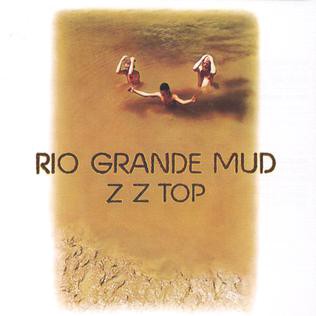
(50) Party on the Patio ? El Loco (1981): Almost an old-fashioned 50s style rock track, a Chuck Barry kind of thing. It doesn?t quite come off, but it comes closer to working than a lot of the other experiments on the El Loco album.
(49) Snappy Kakkie ? Tejas (1976) ? A jazzy song from ZZ Top?s second-most adventurous album (and its most adventurous good album). That Tejas is pulled in so many directions works somewhat to Snappy Kakkie?s disadvantage, though, as it doesn?t fit comfortably with anything that?s happening around it, with maybe the exception of Avalon Hideaway, which has a similar vibe but is also a much stronger track.
(48) My Head?s in Mississippi ? Recycler (1990): You can almost feel Billy Gibbons trying to use blues muscles on My Head?s in Mississippi that hadn?t been exercised in a decade. There?s a decent song in there, but it?s been buried pretty deeply in both shtick and Recycler-era studio goofiness.
(47) Move Me on Down the Line ? Tres Hombres (1973): The most anonymous song off Tres Hombres. Which is not to say Move Me on Down the Line is bad, exactly; it may have perhaps stood out on a lesser album. But against the rest of the album it?s just sort of there.
(46) I Wanna Drive You Home ? El Loco (1981): There?s an extended woman/car metaphor going on that you?d think there?d be like nine of in the ZZ Top catalog (think Panama). The base line and rhythm is not altogether dissimilar to I Thank You, and while I Wanna Drive You Home isn?t as good, it does work a bit for much the same reasons.
(45) Certified Blues ? ZZ Top?s First Album (1971): Better than most of the other tracks on ZZ Top?s First Album, if only because there?s a syncopated funkiness that?s missing from most of the others, which can feel merely derivative.
(44) Whiskey?n Mama ? Rio Grande Mud (1972): About as close as ZZ Top got to classic Southern Rock ? not to be confused with the more country/western elements in Tejas.
(43) 2000 Blues ? Recycler (1990): There?s some Arena Rock tendencies that weigh down 2000 Blues, but it works well enough as a rock ballad.
(42) A Fool for Your Stockings ? Degello (1979): An unusually stripped-down offering from ZZ Top, not terribly dissimilar in that respect from Blue Jean Blues, which I?ve paired it with. Billy Gibbons? vocals are better here, but it?s a less interesting song overall, so it comes out in the wash.
(41) Blue Jean Blues ? Fandango! (1975): Another slowed-down ZZ Top song that just doesn?t quite work for me, though Blue Jean Blues is not without its fans. I think the problem is Billy Gibbons? vocals, which interfere with a smooth pure-blues groove that we don?t get much out of the trio. I will say that a bumped this one quite a few spots up the list after relistening a few times.
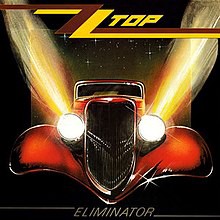
(40) Precious and Grace ? Tres Hombres (1973): Another song about doin? it with some fine ladies, this time in a car. Would rank lower if not for the final minute or so, an intense, climactic sendoff featuring some tremendous guitar work from Gibbons.
(39) If I Could Only Flag Her Down ? Eliminator (1983): Eliminator meanders all over the place stylistically, which isn?t always to the album?s disadvantage. The biggest hits are something new for the band, but a couple of songs reach back to ZZ Top?s El Loco weirdo funk, and If I Could Only Flag Her Down reaches even further back to something close to the pure blues rock of the early albums. It?s not their best effort in that vein, but it is an underappreciated track.
(38) Jailhouse Rock ? Fandango! (1975): A cover of the Elvis Presley classic, performed live. It?s fine, but there are better versions.
(37) Down Brownie ? Rio Grande Mud (1972): Nothing special here, but you do start to get a feel on songs like Down Brownie for why ZZ Top transcended the soup of bands playing southern rock around that same time (a group with which ZZ Top got labeled regularly, and incorrectly, before the synthesizer era). Yes, the themes are the same and sometimes the style can veer in that direction, especially on the first two albums, but the product is often far more taut, as can be heard here. I?ve always particularly enjoyed the very end, a hard period to close the album.
(36) Have You Heard? ? Tres Hombres (1973): Some ZZ Top fans, blessed with more imagination than common sense, think that the Tres Hombres album is some kind of extended allegory on Christianity or something. Why, the ?tres hombres? could be the trinity, and there?s a song about Jesus, kind of, and Master of Sparks lends itself to a kind of metaphorical reading if one were so inclined, and ? well, just ignore the song about the hitchhiking prostitutes and the bordello out in La Grange.
But if you?re inclined to cram the square theory into a round hole, you might point out that ZZ Top?s lone gospelesque effort finishes out their album. It?s not a bad track, maybe strengthened because it carefully walks the line that separates sincere from insincere, when falling too far over either edge would have been disastrous, musically speaking.
(35) Asleep in the Desert ? Tejas (1976): It?s a shame that ZZ Top didn?t put out more instrumental music. Billy Gibbons is one of the best guitarists of his era; Dusty Hill is an extraordinarily underrated bassist and rhythm guitarist; Frank Beard is ? well, he?s plenty competent. The story behind Asleep in the Desert is that Willie Nelson left behind an acoustic guitar at the studio, Billy Gibbons fooled around on it for a few minutes, wrote Asleep in the Desert, and the band threw the lullaby at the end of the album. No idea on the veracity of any of that but it?s a good story.
You get the feeling Gibbons doesn?t much like Asleep in the Desert. It?s the only acoustic track in the ZZ Top catalog, and he?s talked about acoustic guitars being ?bad luck,? whatever that means. That the Tejas album failed so badly just after ZZ Top were first starting to enjoy success might have something to do with it. But Tejas is a wonderfully eclectic album, ranging from blues to country to rock to this, a tableau of the rural Texas landscape. Another Texan, Stevie Ray Vaughan, would fool around in a similar direction a little over a decade later, to similarly decent effect on Riviera Paradise. Vaughn was deprived of the chance of pursuing that line of musicianship further; for ZZ Top, once seems to have been enough. Pity.
(34) She Loves My Automobile ? Degello (1979) ?She don?t love me/She love my automobile? is one of those lines that?s just begging for a blues song to be written around it. And so one was. Nothing special but a good solid track.
(33) (Somebody Else Been) Shaking Your Tree ? ZZ Top?s First Album (1971) ? The first song on ZZ Top?s first album, which was titled ? ZZ Top?s First Album. There?s a 60s vibe to (Somebody Else Been) Shaking Your Tree ? Cream-like maybe describes it best ? which makes sense, seeing as how the album dropped in January 1971, but the song has a different feel than anything else the band would ever again put out. Which isn?t bad, exactly, and is in fact interesting in its own way ? a stylistic dead end that had already been exhausted by other bands that had come on the scene sooner and was quickly discarded.
(32) Thunderbird ? Fandango! (1975): One of three live tracks from the Fandango! album, and I think the best of the three ? Thunderbird is a kind of romping, catchy, almost 50s-like rock ditty. It was also apparently stolen and copyrighted under the noses of the original artists, but hey, no one is perfect.
(31) Sleeping Bag ? Afterburner (1985): The best song off the Afterburner album, which is damning with faint praise (I?m probably overrating it just for the sake of getting an Afterburner song somewhat near the top). Sleeping Bag is catchy in a pop sort of way, though it absolutely grind to a close. ZZ Top?s joint-highest (with Legs) charting song at #8, which is more proof that democracy simply does not work, people.
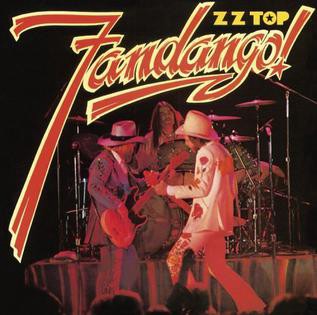
(30) I?m Bad, I?m Nationwide ? Degello (1979): I?ve always been vaguely amused by the image of living large cast by I?m Bad, I?m Nationwide: dude in a big cowboy hat and a gold tooth, rolling in a big car with women wearing nylons and smoking Lucky Strikes. But again you get a prime example of ZZ Top getting to show off their blues chops. Like much of the Degello album, I?m Bad, I?m Nationwide really shines when the guys are jamming, with some nifty bass work from Dusty Hill at the end. One of those fade-out songs where you wish that you could continue listening for a few minutes more.
(29) El Diablo ? Tejas (1976): A funky, blues-country ballad let down by ZZ Top?s general inability to maintain a narrative. So, there?s a guy, and he?s bad, and the cops catch him and hang him, and that?s it? And it ?happened not long ago,? so what are you telling me, really? Marty Robbins this isn?t. But ignore those flaws and you?ve still got a killer hook and some eerie atmospherics, and that counts for a lot.
(28) Chevrolet ? Rio Grande Mud (1972): Aside from, you know, the beards and all the sex stuff, ?Hallelujah, hallelujah/Ride my Chevrolet? sums up the ZZ Top experience pretty well. A slow-groovin? song about cruisin? in an American-made car; it?s amazing this was never used in a commercial.
(27) Sheik ? Tres Hombres (1973): ZZ Top got good mileage out of taking funky material and imposing a more rigid backbone on it; their cover of I Thank You is a prime example. Sheik is a rare (for them) example of the opposite: funky, rolling, off-beat, almost jazz-like, a fever dream in sonic form. Not one of the best songs off Tres Hombres, but only because the whole album is so damned good.
(26) Lowdown in the Street ? Degello (1979) ? An underappreciated deep cut from Degello, an underappreciated album. Another song about hookers ? also about The Fabulous Thunderbirds, weirdly enough ? but in a more upbeat, less sleazy kind of way, which is a nice change of pace.
(25) Avalon Hideaway ? Tejas (1976) ? A dual-vocal effort split between Gibbons and Hill with a funk vibe not dissimilar to Shiek. Another stylistic detour on Tejas, and one of the better ones.
(24) Got Me Under Pressure ? Eliminator (1983): ZZ Top?s concert opener for many years now, Got Me Under Pressure wasn?t one of the big hits from the Eliminator album but has withstood the test of time better than many of the other songs from that album. The line about the femme liking cocaine stands out like an Izod shirt in the no-longer-the-80s, though.
(23) Master of Sparks ? Tres Hombres (1973): Narrative was never ZZ Top?s strong point ? most of the band?s best songs are more evocative than expository ? but Master of Sparks is a rare exception: an unsettling story about some hicks out in the country ?gettin? right on Saturday night,? strapping a guy inside of a welded steel ball with a car seat inside, and pushing it out of a truck while driving down a state highway. Billy Gibbons claimed that it?s a true story and that, if you lived through it (as he did), you got the title ?Master of Sparks.? Regardless, there?s an eeriness that pervades Master of Sparks unlike any other ZZ Top song.
(22) Apologies to Pearly ? Rio Grande Mud (1972): One of two pure instrumentals put out by ZZ Top (the other was Asleep in the Desert) and the better of the two, with Billy Gibbons at the absolute top of his element on guitar. Would be about ten spots higher if not for the engineering decision to fade the final chord directly into Bar-B-Q; after two-and-a-half minutes of solid jamming, Apologies to Pearly deserved a gentle setdown, a moment of relaxation after a fine meal. It?s still a great instrumental despite the error in engineering judgment.
(21) Arrested for Driving While Blind ? Tejas (1976): I mean, look: don?t drive drunk. Instead, sublimate that need into writing a song about driving drunk, preferably one with a stomping blues beat and a smidge of humor. Hey, it?s only blood and grain alcohol.
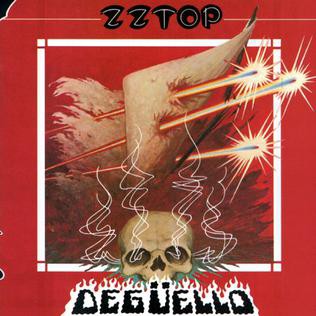
(20) Nasty Dogs and Funky Kings ? Fandango! (1975): One of the purest riffs in the ZZ Top repertoire. A song begging for a cover and reimagining by a metal band.
(19) I Thank You ? Degello (1979): One of two covers off the Degello album (Dust My Broom being the other), and I think the lesser of the two, though still very good. The Sam and Dave original is classic R&B ? funky, cool, upbeat. ZZ Top slow down the tempo a few clicks, replace the horns with Billy Gibbons? guitar, and turn I Thank You into something vaguely sleazy, the sort of thing you might hear at a strip club, but not one of those posh urban strip clubs. It works.
(18) Mushmouth Shoutin? ? Rio Grande Mud (1972): A classic no-bullshit harp, drums, and guitar blues song about a guy who can?t help but take abuse from his woman. There?s nothing groundbreaking here, even within the context of 1972 when the song was released, but Mushmouth Shoutin? is infectious in that way that all classic blues riffs seem to be.
(17) Give it Up ? Recycler (1990): Give it Up is another one of those late ZZ Top efforts where it?s best listened to by ignoring, as much as possible, all the studio add-ons and just groove with the rhythm. It?s not hard to imagine Give it Up, slightly retooled, appearing on Degello or another of the earlier albums, which is higher praise than I can offer for any song on Afterburner.
(16) Hi Fi Mama ? Degello (1979) ? Dusty Hill was underused by ZZ Top as a vocalist. Three of the top sixteen on the list are Hill on main vocals, and another three are back-and-forth between Billy Gibbons and Dusty Hill. After Degello, though, Hill rarely took the main spot behind the mic, which is a crime, as he provides a sheer vocal force that Gibbons is unable to supply. The opening of Hi Fi Mama is a testament to that ? an unadorned Texas shout.
The song is, of course, about something that isn?t sex but is actually about sex, which are overabundant in the ZZ Top catalog. But it?s one of the better examples, firmly planted within the blues-rock style while also branching outside of the band?s comfort zone (where the hell did the saxophones come from?).
(15) Just Got Back from Baby?s ? ZZ Top?s First Album (1971): If you were to listen to all the ZZ Top?s albums chronologically, Just Got Back from Baby?s would be the first clue that what you?re listening to is something more than just a talented bar band. There?s nothing terribly original about Just Got Back from Baby?s ? it?s firmly planted within the blues idiom, so much so that it could easily pass for a BB King song. But the whole thing rolls in a way that?s hard to pull off, and with some decent musicianship from all three members. The first great ZZ Top track.
(14) Dust My Broom ? Degello (1979): The second, less-heralded cover on Degello ? the first is Sam and Dave?s I Thank You ? but the better of the two, though both are good. Dust My Broom had a long heritage as a blues classic by the time ZZ Top recorded this in 1979, going back to Robert Johnson in the 1930s and Elmore James in the 1950s, and covered at one point or another by seemingly every blues artist in the meantime. The ZZ Top version isn?t terribly inventive, but listening to Billy Gibbons play slide guitar within the skeletal framework is a treat.
(13) Hot, Blue and Righteous ? Tres Hombres (1973): The best of ZZ Top?s ballads by some distance, and unlike most of the others, a song that reveals (or purports to reveal) genuine emotional vulnerability, not a trait typically associated with the band. They never captured that magic again ? they didn?t even try all that much ? but it all works here, from the slow-rolling arpeggios to the vocal harmonics. The kind of song that almost demands a drink and a cigarette.
(12) Balinese ? Fandango! (1975): There?s a faux nostalgia in Balinese that would be grating if the song didn?t slap so hard. Gibbons and Hill were in elementary school when the legendary Galveston club, famous as a dance and illegal-gambling hall, was finally shuttered after years of raids by the Texas Rangers; it would be like Taylor Swift singing about how much fun Studio 54 used to be. But the song does slap, including some unusually good (for him) backup vocal work from Billy Gibbons. Hill?s voice steals the show here though.
(11) Tube Snake Boogie ? El Loco (1981): The lone redeeming aspect of the El Loco album is Tube Snake Boogie. There?s nothing deep going on here, nothing all that interesting musically, but it?s got a nice groove and it?s fun, and fun is good.
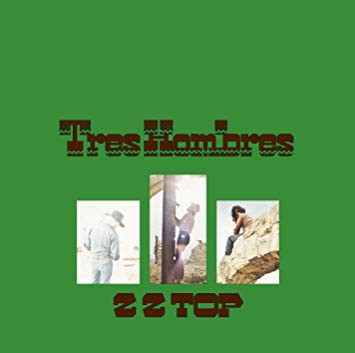
(10) Heard it on the X ? Fandango! (1975): The dueling-lyricist style was one that treated the band well (and should have been used more). Here we have a paean to the unregulated radio stations just on the other side of the Mexican border playing everything ? ? Country Jesus, hillbilly blues,? as Dusty Hill puts it.
At their best, it?s amazing how much ZZ Top could cram into two-and-a-half minutes; one marker of the lesser albums is that the track lengths creep steadily higher. Fandango! features four studio-recorded songs that come in at under three minutes. I?m sure not coincidentally, they?re the best four tracks on the album.
(9) Sharp Dressed Man ? Eliminator (1983) ? Sharp Dressed Man is maybe the most culturally enduring song from Eliminator, because it?s practically crying out to be used in movie makeover montages and the like. That doesn?t make it good, of course ? if anything, that would make it more likely to be bad, in that way that all crying-out-to-be-used music is usually bad ? but even with that, and even after all the studio effects, the Sharp Dressed Man simply works, period, perhaps because it is more firmly grounded in the idiom of blues rock than some of the other songs from the studio era. If you don?t believe me, revisit the guitar solos.
(8) Beer Drinkers & Hell Raisers ? Tres Hombres (1973): The best of the dueling-lyricist ZZ Top songs, which is saying something, because there are a couple high up this list (I don?t count It?s Only Love, which is slightly different, as discussed below). The reason might be that the vocal styles of Billy Gibbons and Dusty Hill were so different, with Gibbons capable of conveying a broader range of emotion (though not as broad as he attempted), while Hill was blessed with more natural talent and a stronger set of pipes. They?re both at their best here, playing off each other beautifully, all with a wild, frenetic guitar that is not usually associated with the Texas trio. There?s a reason Motrhead covered this one; there?s also a reason Motrhead couldn?t do anything with the song besides paying homage like a second-rate cover band.
(7) Just Got Paid ? Rio Grande Mud (1972): The oldest song still wheeled out by ZZ Top at concerts today, and for good reason. Just Got Paid is pure blues delight, from the slide guitar work of Billy Gibbons to the playful lyrics. This is American roots rock at some of its very best.
(6) Gimme All Your Lovin? ? Eliminator (1983): There?s a sharp divide between pre-Eliminator fans of ZZ Top and post-Eliminator fans, with the breakout album used as the marker for when the band went from roots-blues to pop rock. That?s not entirely fair in either direction. There were hints of direction ZZ Top would go in the 1980s as far back as Degello, and El Loco (1981) has more in common stylistically with Eliminator (1983) than anything that had come before it. Eliminator was just the album that worked.
Some of why it worked was simple right place, right time: the beards, the cars, the music videos, MTV, the perfectly (and deliberately) calibrated 120-beats-per-minute. But buried under the glitz and the studio effects were a handful of songs that, at bottom, were still the same stomping blues-rock style as before. I have no idea why Billy Gibbons decided a drum machine would be better on Eliminator than Frank Beard, but a funny thing happens when ZZ Top plays songs like Gimme All Your Lovin? live, deprived of all the tricks ? they groove just as well, and in the same way, as the old blues-based classics. And Gimme All Your Lovin? is the best of the bunch off the album that made ZZ Top rich.
(5) Waitin? for the Bus/Jesus Just Left Chicago ? Tres Hombres (1973): It remains unclear whether splicing the two songs together was intentional. My guess is yes ? Waitin? for the Bus ends too abruptly otherwise ? but in either case, the result was one of the best ?Siamese twin? tracks of all time; I couldn?t possibly separate them on the list. Best played with the bass turned up as high as the volume goes, preferably while driving with the windows open and, if all all possible, with the top down on your convertible. Take me with you, Jesus.
(4) It?s Only Love ? Tejas (1976): The Tejas album wanders all over the place in style, but one of the common themes is a more country aspect than had been on any of ZZ Top?s previous works. Or, for that matter, subsequent works; they?d dabble in country again, covering songs like Tennessee Ernie Ford?s Sixteen Tons, but always by reinterpreting those songs into a blues idiom. A few of the Tejas songs, though, stick mainly within the country style without wandering into the blues. It?s Only Love is notable for how seamlessly ZZ Top melded the two styles: not a country song translated into the blues, but a pigdin of both, twangy steel guitars and harmonica solos.
So there?s already something interesting going on here. Then add to that one of the band?s more subtle thematic developments on regret and love lost. It?s Only Love is a dual-lyric song between Gibbons and Hill, but not a beck-and-call like Heard It on the X or Beer Drinkers and Hell Raisers. Instead, it?s a character play. Gibbons sings the first verse about a lady about to run away ? classic heartbreak theme. He then starts the second trying to cheer himself up (?Well after runnin? round a time or two/I found out only the best will do?) when his companion, up until now patiently listening, chimes in with some tough love (?Well it?s your own fault for lettin? her go/So maybe now you?ll take it slow?). A contrite Gibbons returns, and Hill now offers sympathy. Hill?s vocals are at their very best here: powerful, melodic, a strong counterpart to Gibbons? gravel. And the whole thing ends with a tremendous, energetic howl-at-the-moon duet (really trio; there?s an extra Hill dubbed in).
I?ve always thought Tejas, and particularly It?s Only Love, may have changed ZZ Top forever. Here?s a song with all the makings of a hit, coming just off a major success in Fandango! and particularly Tush, but that couldn?t crack the Top 40. Never again would ZZ Top experiment in the same direction ? first came a return to their roots in Degello (coupled with new waist-lengthed beards), then adventures into pop-rock ? and It?s Only Love was more or less banished: rarely performed live, not appearing on the 1992 Greatest Hits album, etc. That?s a shame.
(3) Cheap Sunglasses ? Degello (1979): It?s almost impossible to identify ? for me, anyway ? what makes something like TV Dinners a thematic nonstarter that can?t also be said of Cheap Sunglasses. Both songs are about something cheap and disposable ? a silly theme, a mere bagatelle. Maybe it?s that there?s something else about cheap sunglasses (the thing, not the song), a feel of coolness despite the flimsiness. A morning requirement after a long night out; an three-dollar accouterment on an otherwise chic woman. There?s something classically blues about taking a throwaway wisp of a theme and turning into something you can?t stop singing all day.
Of course, none of it would matter if the music weren?t any good. But it is good; very good. Everything is working in Cheap Sunglasses. We get studio effects with the patina of something unpolished ? a broken amp and, if you listen closely, a few missed chords. We get some of Frank Beard?s niftier drumwork. We get rhymes like molasses and sunglasses. The final minute is one of the better grooves in all of blues rock while sounding fresh, even improvised. A lesser song ? a lesser production ? would have faded all that out in production rather than letting it rattle home to a close. It?s impossible not to feel cool listening to this one.
(2) Tush ? Fandango! (1975): Tush is damn close to the Platonic ideal of a rock song. Energy: check. Three damned chords: check. A hook that makes you take notice within two seconds of the song starting: check. Bangin? guitar solo in the middle and end: check. Under 150 seconds: check. Allegedly written in ten minutes, Tush is tighter than a gnat?s?tush. Take your prog rock and shove it.
(1) La Grange ? Tres Hombres (1973): I?ve written this a few times while going through the list, but there isn?t a great deal that?s original in anything ZZ Top is doing. More than once the band has crossed on the wrong side of the copyright line. The band?s famous guitar line ? ?that thing you play,? as Dusty Hill says it to Billy Gibbons? isn?t too far off from classic blues riffs put out by John Lee Hooker and Slim Harpo; the a-how-how-how-hows are a direct homage to Hooker as well.
But the joy of the blues ? yes, joy ? is the way in that a few elemental materials can be used to build so much that is unique. The riff, that semi-borrowed riff, is among the most famous in rock for a reason; it sets the deep foundation beneath what is, essentially, an instrumental track ? the final three minutes of the four-minute song is a jam session. The theme is, of course, sex, the most well-worn subject matter in both the ZZ Top catalog and the blues catalog more generally, but this time it?s different: not a tale of exploits, but this time a whispered story about a ?[r]umor spreadin? round? about the little shack outside La Grange. ?You know what I?m talkin? about.? The narrator seems to know an awful lot about the shack, including the price of admission, but the lyrical portion of the song ends on a peculiar offbeat: ?but now, I might be mistaken.? And then the magic really begins.
The key to good rock music is that you can absolutely feel it in your bones ? not only because of volume, though that helps, but because the rhythm and sound can draw out something primeval from deep within. La Grange passes that test about as well as any song I know; most people are constitutionally incapable of listening without at a minimum tapping a foot. And that?s the point of it all: to lose yourself and your worries for four minutes at a time.
